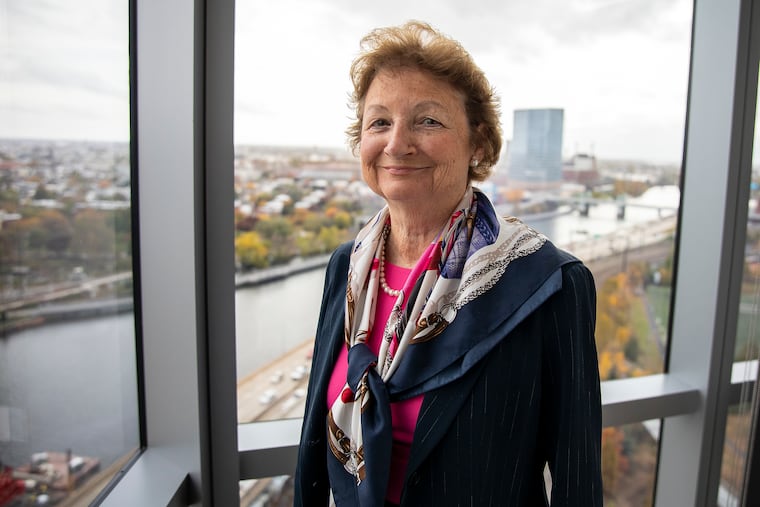‘Like a traveler on the Oregon Trail’: Katherine High on making gene therapy a viable option | Industry Icons
Kathy High was at the epicenter of creating gene therapy, "and she has put Philadelphia at that epicenter,” one expert said.

“You need the stamina of a long-distance runner.”
Katherine High was describing what it takes to do a difficult thing well — in this case, get gene therapy out of the lab and into the world to the patients who need it.
High, 68, is the cofounder, president, and head of R&D at Spark Therapeutics in Philadelphia, and also emeritus professor of pediatrics at the Perelman School of Medicine at the University of Pennsylvania. In 2017, Spark scored big-time when its product Luxturna, used to treat a rare eye disease, was approved by the FDA – the first gene therapy approved in this country for use in human beings. That’s an enormous first.
Success took a long, long time. “We started clinical trials in 2007,” she said, “and I had been working on gene therapy for decades before that. I sometimes have felt like a traveler on the Oregon Trail who says to themselves, ‘I’m probably going to die on this trail, so I better leave really good notes for the people who are coming after me.’”
“When the history books are written,” said Lars Ekman, executive partner at Sofinnova Investments in Menlo Park, Calif., “the period around 2004-5 will be remembered as a defining moment that ultimately transformed the field of medicine as we know it. And that is because of the pioneering work of Katherine High, along with Steven Altschuler [then CEO of Children’s Hospital of Philadelphia] and the support of CHOP’s board. She was at the epicenter of gene therapy, and she has put Philadelphia at that epicenter.”
It has been a roller-coaster ride for gene therapy. It’s incredibly hard, and to make a product out of it is even harder. You have to clone the gene, design a vector (a way to carry it to the target tissues in the body), get it past the patient’s immune system, and get it to work. You have to prove all that to the FDA, get your product approved, and then market it. On the business side, you need to line up investors, and you need a product that isn’t so astronomically expensive that it isn’t cost-effective.
Gene therapy had an initial upswing in the 1990s but ran into setbacks at the turn of the millennium. “The rest of the world just gave up, threw up their hands,” as Ekman put it. “‘We’re out of here. It’s too dangerous and difficult.’”
High was there, a faculty member at CHOP. Beginning in the late 1990s, she’d been collaborating with a small California biotech called Avigen on gene therapy for a kind of hemophilia. “But when these high-profile adverse events happened in other trials,” she said, “investment dried up, and the big pharmaceutical companies and biotechs didn’t want to touch it.” That included Avigen.
So she went to Altschuler and in effect asked, “Could you please fund me a manufacturing center I could run here at CHOP?” Her aim: to create a gene-therapy system she could use in clinical trials.
To her amazement, Altschuler said yes. “He did it,” High recalled, “because he knew it would be good for children’s hospitals, which bear the burden of genetic diseases because they treat children.” Starting in 2004, High began to recruit top talent.
Things went so well that Spark was born in 2013, with CHOP investing the start-up money.
That’s where High’s talent for business – which she didn’t know she had – came into play. Altschuler, now chair of the board at Spark and managing director of health-care ventures at Ziff Capital Partners in New York, calls her a natural.
“There are very few academic physician-scientists who can make the transition from the academy to business as well as Katherine has,” he said. “Incredible – that’s the only word for it. She was really embraced by the investor community. Her rapport with them, talking to them in a language they really understood, propelled her success and that of Spark. The ability to get investors excited about the work you do is key – and they really have been, starting at the IPO.”
Altschuler said he’s always been impressed by her sense of purpose: “She was always singularly focused on developing gene therapy that would benefit patients.”
About reaching that elusive goal, High said: “It has been a very rewarding experience to see gene therapy finally borne out. It has brought home to me the importance of soldiering all the way through.”
And more is to come. “There are always new problems to solve, new things about the business to learn,” High said. They are still working on immune-response issues, for example – and that hemophilia product is still in the future. “But you have to be content to solve the problems you can solve today,” she said, “so that there will be a tomorrow.”